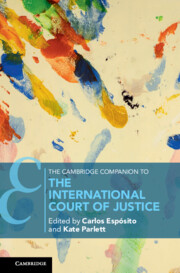Book contents
- The Cambridge Companion to the International Court of Justice
- Cambridge Companions to Law
- The Cambridge Companion to The International Court of Justice
- Copyright page
- Contents
- Contributors
- Preface
- Introduction
- Part I The Role of the ICJ
- Part II The ICJ and International Dispute Settlement
- 6 The Jurisdiction of the Court
- 7 Provisional Measures
- 8 The International Court of Justice as the Master of the Sources
- 9 Fact-Finding and Expert Evidence
- 10 The ICJ and Other Courts and Tribunals: Integration and Fragmentation
- 11 The Working Practices of the Court
- 12 Procedure in Contentious Cases: Evolution and Flexibility
- 13 Effective Advocacy at the ICJ
- Part III The Impact of the ICJ’s Jurisprudence
- Index
- References
13 - Effective Advocacy at the ICJ
from Part II - The ICJ and International Dispute Settlement
Published online by Cambridge University Press: 18 May 2023
- The Cambridge Companion to the International Court of Justice
- Cambridge Companions to Law
- The Cambridge Companion to The International Court of Justice
- Copyright page
- Contents
- Contributors
- Preface
- Introduction
- Part I The Role of the ICJ
- Part II The ICJ and International Dispute Settlement
- 6 The Jurisdiction of the Court
- 7 Provisional Measures
- 8 The International Court of Justice as the Master of the Sources
- 9 Fact-Finding and Expert Evidence
- 10 The ICJ and Other Courts and Tribunals: Integration and Fragmentation
- 11 The Working Practices of the Court
- 12 Procedure in Contentious Cases: Evolution and Flexibility
- 13 Effective Advocacy at the ICJ
- Part III The Impact of the ICJ’s Jurisprudence
- Index
- References
Summary
The second part concludes with a chapter on effective advocacy before the ICJ, by Samuel Wordsworth QC and Kate Parlett. It examines both written and oral advocacy before the Court, with the fundamental objective of the advocate in all cases being to persuade, making it essential to consider what will be of most utility to the judges when they come to reach a decision on the case. They also emphasise the significant role the advocate has to play in the pre-litigation stage and in early procedural exchanges: she or he must bear in mind that they have a dual function of presenting the best case for the client to the Court, while also persuading the client as to the most effective way in which to do that.
- Type
- Chapter
- Information
- The Cambridge Companion to the International Court of Justice , pp. 277 - 300Publisher: Cambridge University PressPrint publication year: 2023



